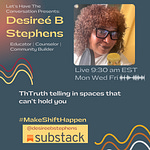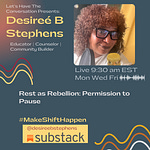Saying No Without a Thesis Statement: Wildfires, Witness, and the Wisdom of Refusal
We opened with this song. I chose this song because it echoes what so many of us know in our bones: Resistance doesn’t always come loud. Sometimes it simmers, it sobs, it survives. In the embers of oppression, we don’t just burn out, we burn brighter.
“But we will never show fear / Even in my eyes / I will always rise… in wildfires.”
— Sault, “Wildfires”
They want a dissertation before they’ll accept your boundary.
They want citations, softness, and a smile before they’ll accept your “no.”
But beloved, what if you don’t need a thesis statement to justify your humanity?
What if your lived experience, your body’s knowing, and your spirit’s refusal are all the proof required?
This week on Let’s Have the Conversation, we opened with Sault’s “Wildfires”(a freedom song disguised as a whisper) and unpacked how often our “no” has to come dressed up in logic, leniency, or labor.
We were never meant to beg for liberation. We were born with the right to refuse. Learn the language of oppression, so you become fluent in liberation.
“Don’t take it personally.”
“It’s not that deep.”
“We’re all doing our best.”
These phrases sound soft, but often they’re used to dull sharp truths. They end conversations instead of inviting change.
Here’s what we uncovered:
1. No is a Complete Sentence
Reframe: Refusal is not rudeness. It’s regulation.
Example: You tell a co-worker you can’t take on another project. They push back. You say no again (without apology, without explanation) That is the full sentence.
Reflection: Where in your life are you over-explaining a “no” that your nervous system has already decided?
2. Our “No” is Often More Believable When We’re Broken
Reframe: You don’t have to bleed to be believed.
Example: Systems often require us to be in crisis before they listen. Think about how parents have to fight schools to honor IEPs or 504s, and it’s only when the child is in full meltdown that services kick in.
Reflection: Who taught you that pain was your only pathway to being heard? And how can you reclaim your “no” before collapse?
3. Liberation Doesn’t Require Translation
Reframe: Not everything sacred needs to be explained.
Example: Saying “I’m not available for that” to someone who is used to your yes can be revolutionary. No clarifying. No justifying. Just clarity.
Reflection: What would shift in your life if you believed your boundaries didn’t need branding?
A Wee Preview
“We live in a world where the system won’t honor your no unless you’re sobbing. Unless you’re bleeding. Unless you’re broken beyond repair. That’s the only time people take your ‘no’ seriously. But what if we reclaimed no as a full sentence, as a spiritual practice—not something that needed justification or backstory or pain to be valid?”
This powerfully embodies the spirit of the conversation: That your boundaries do not require breakdowns to be believed. It draws a direct line between emotional labor, worthiness, and the oppressive demand for suffering as a form of proof. You don't owe your pain as currency for peace.
Why Wildfires Was the Right Opening
Sault’s Wildfires isn't just a song. It’s an invocation.
It reminds us that even in the aftermath of violence, grief, and systemic erasure, there is resistance.
There is care.
There is clarity.
And there is refusal.
“Even through my tears / I will always care…”
Because care without consent is not care—it’s compliance
🎧 Missed the Live? You can watch the replay, Paywall Transition
Ready to deepen this work? Join us inside the full companion series.
✨ $8/month
✨ $80/year
✨ $120/year Equity Partner
Scholarships available at: scholarships@desireebstephens.com
This work isn’t just content, it’s a container.
Let’s unlearn together. Let’s say no together. Let’s rise in wildfires.











